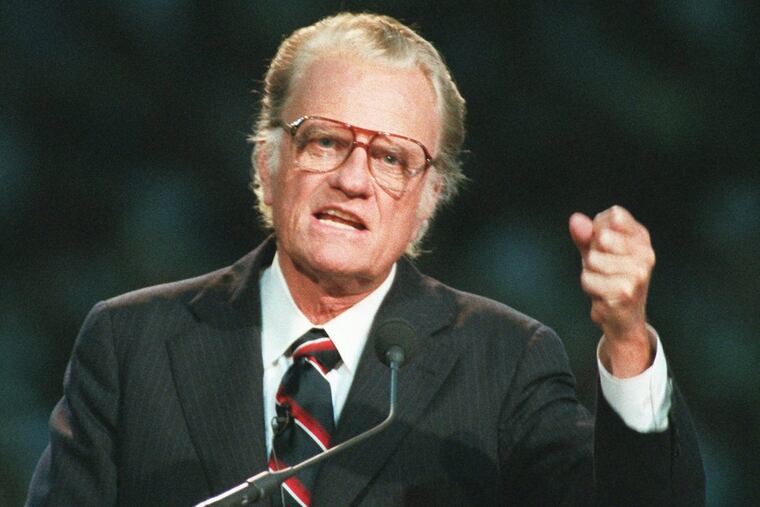Billy Graham: Neither prophet nor theologian | Opinion
Graham's effects are impossible to quantify. His audiences were exhorted to make a "decision" for Christ, but a moment of volition might be (in theologian Dietrich Bonhoeffer's phrase) an exercise in "cheap grace." Graham's preaching, to large rallies and broadcast audiences, gave comfort to many people and probably improved some.

WASHINGTON — Asked in 1972 if he believed in miracles, Billy Graham answered: Yes, Jesus performed some and there are many "miracles around us today, including television and airplanes." Graham was no theologian.
Neither was he a prophet. Jesus said, "A prophet hath no honor in his own country." Prophets take adversarial stances toward their times, as did the 20th century's two greatest religious leaders, Martin Luther King and Pope John Paul II. Graham did not. Partly for that reason, his country showered him with honors.
So, the subtitle of Grant Wacker's 2014 book, "America's Pastor: Billy Graham and the Shaping of a Nation" (Harvard University Press), is inapposite. When America acquired television and a celebrity culture, this culture shaped Graham. Professor Wacker of Duke's Divinity School judges Graham sympathetically as a man of impeccable personal and business probity.
» READ MORE: Billy Graham in Philadelphia
Americans respect quantification, and Graham was a marvel of quantities. He spoke, Wacker says, to more people directly — about 215 million — than any person in history. In 1945, at age 26, he addressed 65,000 in Chicago's Soldier Field. The 1949 crusade in Los Angeles, promoted by the not notably devout William Randolph Hearst, had a cumulative attendance of 350,000. In 1957, a May-to-September rally in New York had attendance of 2.4 million, including 100,000 on one night at Yankee Stadium. A five-day meeting in Seoul, South Korea, in 1973 drew three million.
Graham's effects are impossible to quantify. His audiences were exhorted to make a "decision" for Christ, but a moment of volition might be (in theologian Dietrich Bonhoeffer's phrase) an exercise in "cheap grace." Graham's preaching, to large rallies and broadcast audiences, gave comfort to many people and probably improved some.
Regarding race, this North Carolinian was brave, telling a Mississippi audience in 1952 that, in Wacker's words, "there was no room for segregation at the foot of the cross." In 1953, he personally removed the segregating ropes at a Chattanooga crusade. After the Supreme Court's 1954 desegregation ruling, Graham abandoned the practice of respecting local racial practices. Otherwise, he rarely stepped far in advance of the majority. His 1970 Ladies' Home Journal article "Jesus and the Liberated Woman" was, Wacker says, "a masterpiece of equivocation."
The first preacher with a star on Hollywood's Walk of Fame was an entrepreneurial evangelical who consciously emulated masters of secular communication such as newscasters Drew Pearson, Walter Winchell, and H.V. Kaltenborn. Wielding the adverbs nearly and only, Graham, says Wacker, would warn that all is nearly lost and the only hope is Christ's forgiveness.
Graham frequently vowed to abstain from partisan politics, and almost as frequently slipped this self-imposed leash, almost always on behalf of Republicans. Before the 1960 election, Graham, displaying some cognitive dissonance, said that if John Kennedy were a true Catholic, he would be a president more loyal to the pope than to the Constitution but would fully support him if elected.
Graham's dealings with presidents mixed vanity and naivete. In 1952, he said he wanted to meet with all the candidates "to give them the moral side of the thing." He was 33. He applied flattery with a trowel, comparing Dwight Eisenhower's first foreign-policy speech to the Sermon on the Mount and calling Richard Nixon "the most able and the best trained man for the job probably in American history." He told Nixon that God had given him, Nixon, "supernatural wisdom." Graham should have heeded the psalmist's warning about putting one's faith in princes.
On Feb. 1, 1972, unaware of Nixon's Oval Office taping system, when Nixon ranted about how Jews "totally dominated" the media, Graham said: "This stranglehold has got to be broken or this country is going down the drain." He also told Nixon that Jews are "the ones putting out the pornographic stuff." One can reasonably acquit Graham of anti-Semitism only by convicting him of toadying. When Graham read transcripts of Nixon conspiring to cover up crimes, Graham said that what "shook me most" was Nixon's vulgar language.
Of the My Lai massacre of Vietnamese civilians by U.S. troops, Graham said: "We have all had our My Lais in one way or another, perhaps not with guns, but we have hurt others with a thoughtless word, an arrogant act, or a selfish deed." Speaking in the National Cathedral three days after 9/11, he said "it's so glorious and wonderful" that the victims were in heaven and would not want to return.
Graham, Wacker concludes, had an attractively sunny personality and was "invincibly extrospective." This precluded "irony" but also "contemplativeness."
George F. Will writes a twice-weekly column on politics and domestic and foreign affairs for the Washington Post. georgewill@washpost.com @georgewill